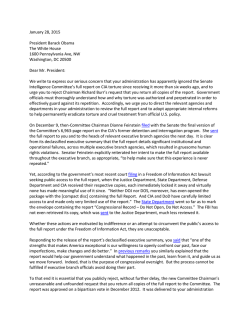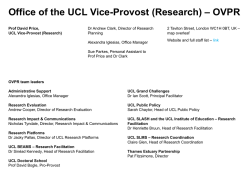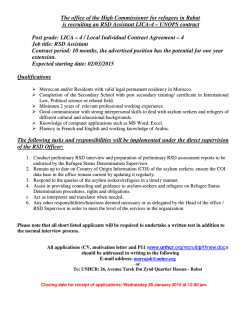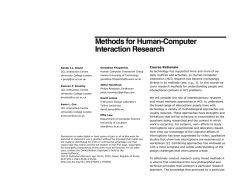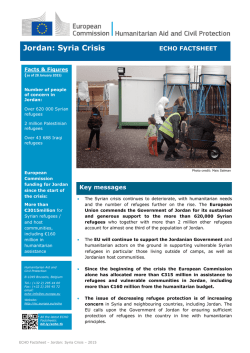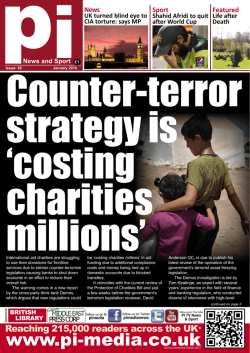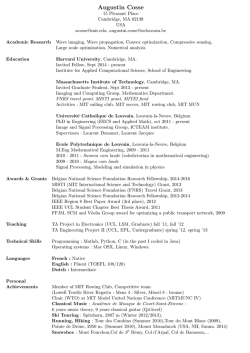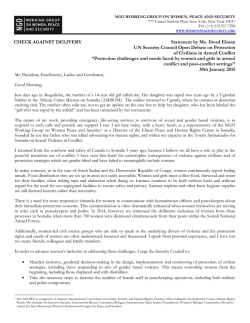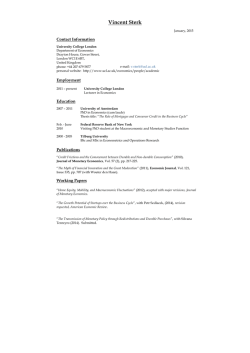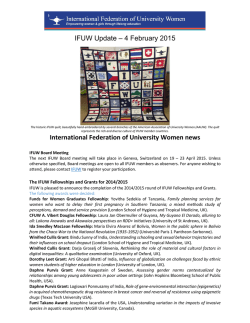
Caring for the Survivors of Torture
UCL public policy Caring for the Survivors of Torture ucl policy briefing – january 2015 Authors Dr Aaron Parkhurst UCL Anthropology [email protected] Dr Aarathi Prasad UCL Science, Medicine and Society Network [email protected] Sarah Chaytor Head of UCL Public Policy Office of the UCL Vice Provost (Research) [email protected] Introduction This briefing considers some of the difficulties which people marginalised through violence and torture share in recovering from trauma in the countries in which they seek refuge. There are a number of complex challenges in recovering from such trauma, including: the complex nature of their illnesses; lack of funding for some therapeutic avenues; and political and social stigmatisation of asylum seekers. Summary of recommendations • International human rights policies must be enforced by individual countries and the European Court of Human Rights to protect the lives of those refugees who are most vulnerable •The UK should relax restrictions on asylum seekers that prevent them from seeking work – a vital means of integrating into society • Health planners should adopt models of ‘sustained recovery’, focusing on programmes for long term integration and emotional development for victims of torture and political violence • Health budgets should provide funding for community projects that have been proven to address the psychological needs of patients. Attitudes towards asylum seekers Key points • Social attitudes towards refugees, coupled with legal restrictions on their right to work and integration into society, can compound their suffering and impede recovery • Recovery from torture is extremely complex and requires the treatment of a range of symptoms over a long period of time: • Art therapy and other non-biomedical therapeutic interventions can provide crucial routes to recovery Many refugees focus only on fleeing danger, not on where they are fleeing to. Their destinations are often unknown to them, and their journeys characterised by intense anxiety and uncertainty. However, affluent societies fail to adequately understand or respond to these circumstances. In England, a previous tolerance for refugees (following the Second World War) has been replaced by a perception that rather than fleeing hardship, refugees are now attempting to ‘infiltrate’ society. This is reflected in public policy; for example, asylum seekers face increasingly harsh hurdles for integration, with the state taking up to ten years to process their cases, during which they are left in stasis and poverty, unable to legally work and begin the necessary steps to recovery. The nature of the illness of torture victims There are a number of common symptoms that characterise the health of those who have fled violence. Many individuals have suffered a range of physical trauma, which is exacerbated by difficult journeys to new countries. Symptoms can persist beyond recovery from physical trauma and last for years. Individuals may be withdrawn; can be irritable or angry; may harm themselves; may suffer from poor sleep and appetite; and may hear voices. Suffering trauma can also result in a deep mistrust of others. This can be compounded by a feeling of loss of agency – heightened through the uncertainty that governs the asylum-seeking process – and incomplete memories of the past which undermines a sense of identity. Effective health programmes must establish a model of ‘sustained recovery’ which understands that trauma remains, even when the individual appears stable, and includes more than medical treatment. It also addresses the loss of agency and the fragmentation of identity. Individuals need help in structuring their narratives, both their own health and in order to comply with the necessary bureaucratic steps to seek asylum in host countries. Case study: Freedom from Torture Freedom from Torture is a medical foundation for the care of victims of torture which provides art therapy sessions which helped survivors to create art, share stories, and connect with each other. Given the difficulties for refugees in integrating into British society, these personal connections can be extremely valuable in helping survivors to cope with the trauma that they have experienced. However, cuts at the organisation have meant that the art studio has been closed. Art therapy Artistic and creative enterprise can offer a powerful and effective intervention for long-term trauma through providing multiple avenues towards increased wellbeing. Such intervention can: address the violence that refugees have suffered; provide a means of articulation for those who have difficulty developing a voice; consolidate images and memory in an abstract way; and form connections between people, thoughts, and memory (which victims of torture are missing in their daily lives). Participation in art therapy can also provide a common ground between individuals and a wider society and offer outsiders insights into the tortured mind. Social workers and clinicians may thus use art therapy to improve torture victims’ wellbeing. However, currently there is a systematic neglect of understanding health in the context of cultural perceptions of wellbeing1. The crucial role of community in developing social and individual well-being in England is exacerbated by increasing financial and bureaucratic restrictions. Therapeutic services which provide people with voices and narratives – and arguably are those most needed by survivors of war and torture – are the first to be cut in moments of austerity. Conclusions Art therapy services are an important part of therapeutic interventions to support the recovery of victims of torture. As policymakers and health planners determine new health infrastructures in Britain, they must reflect upon the way care is delivered for people who do not fit within current biomedical frameworks. Incorporating non-biomedical therapeutic interventions can help to address the needs of victims of violence, and would also be highly cost effective (relatively low cost to achieve a significant health impact). 1 The Lancet, Vol. 384, No. 9954, p1607–1639. Background Organised and sponsored by UCL’s Science, Medicine and Society Network in March 2014, this roundtable meeting brought together experts on the experience of asylum seekers and torture survivors to discuss routes and obstacles to well-being in the aftermath of intense violence and hardship. The multi-disciplinary panel and discussion included activists, artists, therapists and clinicians, anthropologists and survivors of torture, Recommendations • International human rights policies must be enforced by individual countries and the European Court of Human Rights to protect the lives of those refugees who are most vulnerable, particularly those who are detained in refugee camps outside national borders. Those detained (in detention centres or prisons) should have better access to medical care and clearly defined, enforceable routes of reporting previous torture. • Global political discussions on the movement of asylum seekers and refugees should reflect their need to flee violence and counter prevailing attitudes that refugees are economic migrants. • The UK should relax restrictions on asylum seekers that prevent them from seeking work – a vital means of integrating into society (as was the case for Second World War refugees, who were able to work and pay taxes, contributing to their integration and rehabilitation). • Health planners who cater to the wellbeing of victims of torture and political violence should adopt models of ‘sustained recovery’, focusing on programmes for long term integration and emotional development • Health budgets should provide funding for community projects, and specifically art therapy studios, that have been proven to address the psychological needs of patients when many other forms of intervention fail. With special thanks to: Megan Clement: Deputy Editor, The Conversation Dr Angela Hobart: Director, Centro Incontri Umani and Honorary Professor, UCL Professor Cornelius Katona: Medical Director, Helen Bamber Foundation and UCL Division of Psychiatry Tania Kazcynski: Art therapist Dr. Ewen Macmillan: Justice Alliance, expert witness and Trustee,Kent Refugee Help Sheila Melzak: Consultant Community Child and Adolescent Psychotherapist, Baobab Centre for Young Survivors in Exile Professor David Napier: Director of the UCL Science, Medicine and Society Network, and Professor of Medical Anthropology, UCL Perico Rodriquez: Former political prisoner and psychological therapist, Freedom from Torture Dr. Amanda Williams: Clinical Health Psychologist, UCL
© Copyright 2026
